FIRST IMPRESSION MANAGEMENT
Controlling the decisions that are made about you
First impressions are important. They can be the difference between landing a new client and losing out to a competitor. But what many people don’t realize is that first impressions are often based on subconscious cues. This means that we often pick up on things that we’re not even aware of, and these cues can influence our opinion of someone without us even realizing it.
So how can you control your first impressions? The key is to be aware of the cues that you’re giving off and to make sure that they’re the ones that you want people to pick up on.
Of course, it’s not always possible to control every aspect of your first impression. But by being aware of the cues that you’re giving off, you can make sure that you’re putting your best foot forward. And in today’s competitive world, that can make all the difference.
What is Impression Management?
Impression management is the process of consciously controlling how others perceive you in order to achieve certain goals. This can include everything from making a good impression at work or in social situations to managing your reputation and professional image. While impression management may seem like an inherently selfish act, it is actually quite necessary. Studies have shown that people are constantly making judgments about others based on their verbal and nonverbal cues, and impression management can help you to control these perceptions in order to achieve your desired results.
At work, impression management is especially important. This is because we are constantly bombarded with judgments that can have a significant impact on our success. So let’s take a closer look at what these decisions actually are.
11 Rapid Fire Decisions to Consider for your Impression Management
It’s sad but true. People will judge you. They will judge you based on your appearance, the things you say, the way you act, and more. Finding out what people are basing their judgments on could be a blessing or a curse. But when it comes to business, having an idea of what people are thinking will ensure you are making the best possible impression on your clients.
There are a variety of studies that have been done that examine what people notice when they first meet someone and decide everything from whether or not they are fit for a job to if they can trust you.
Here is the result of just one of the many studies that have been done on impression management and the rapid-fire decisions others make about you—and hence you can manage how you are perceived.
1. Economic Level
From the moment you meet someone, their impression of you will be influenced by whether or not they think you have money (or have the ability to generate it.) This impression can affect their interactions with you for better or for worse – and it can also cause them to avoid you. The perception of your economic level may be determined by the clothes you are wearing, your job title, or even just the look on your face. Your goal should be to create a positive impression that is based on more than just money, so that your clients will have no doubt about the value you can bring to them.
2. Education Level
Education isn’t everything, but it is important to some people. Your impression on clients may also be based on how much education you have and what kind. If your client sees that you are highly educated, they may assume that you have the expertise to get the job done right. However, if their impression is that you are less educated than them or not as qualified for the work, it could negatively impact your impression. The perception of your educational level is something you can control, so be sure to highlight your credentials and expertise at all times.
3. Competence, Honesty, Believability, Credibility
Clients are instantly assessing these factors when they first meet you, so it’s important to ensure that you come across as knowledgeable and trustworthy – or else face the risk of losing out on business. Make any adjustments that are necessary to ensure that they have confidence in you and your abilities. Being perceived as competent requires you to have a good grasp of the facts and be able to answer any questions that come up. Honesty means being upfront about your capabilities and admitting when you don’t know something. And believability is all about having strong communication skills and coming across as genuine. Last but not least, credibility means that clients feel you can deliver on your promises – and it’s something you should always strive for.
4. Sex Role Identification
While it’s important to get your pronouns correct, no one should be concerned about your private life. However, many are curious. Your sex role identification can indeed be used to your advantage when it comes to impression management. But most importantly, never forget — you are perfect just the way you are, no matter what impression you may be trying to make.
5. Level of Sophistication
Sophistication is relative when it comes to professionals. It’s important to reach clients on their level. For example, if you are a luxury brand, you will want to come across as being more sophisticated than someone who runs a kids’ toy company. But if you are running a kids’ toy company, you will want to show off your knowledge of children and what they like. Being perceived as sophisticated is all about how you come across to your clients. So do some research, understand their interests and needs, and then tailor your impression management accordingly.
6. Trustworthiness
It’s essential that clients trust you. If they don’t trust you, they won’t want to do business with you. Trust is built on a number of factors, including credibility, competence, and honesty. Without these qualities, it will be nearly impossible to get your clients to trust you. Therefore, it’s important that you always strive to be ethical and provide great results for your clients – because in the long run, this impression is what will help build strong relationships with them and lead to repeat business.
7. Level of Success
Your level of success will be based on past achievements as well as rewards and recognition. If you are successful enough, people will be aware of your reputation via word of mouth. However, it’s smart to back these up by displaying your awards and certificates in your office and by mentioning achievements on your website. Being perceived as successful is a key part of impression management. After all, no one wants to do business with someone who can’t succeed in delivering on their promises.
8. Religious Background
Religion can be a controversial issue, but it’s something clients will think about once they get to know you. Some people won’t consider religion heavily in choosing to work with you, while others will. Still, unless religion an integral to your industry or mentioned in conversation, it’s usually best to avoid discussing your personal religious beliefs. You will never want a client to feel like you are preaching to them or pushing your religious beliefs on them. However, if religion is important to you or if your clients bring it up, then it’s something worth addressing in a professional manner.
9. Political Background
Politics are another hot-button issue that’s best left out of the conversation if possible. It typically does more harm than good. Instead, focus on the issues that are relevant to your industry and let clients draw their own conclusions about how you feel about things outside of work. However, if politics has come up in conversation a few times or if it’s likely something your clients will want to know before working with you, then it may be best to speak frankly but professionally about where you stand on matters. But still, this will always be thin ice to navigate, so proceed with caution.
10. Social, Sexual, and Professional Desirability
Desirability isn’t just about sex – it’s also about being considered socially attractive and having a reputation as a professional. Your desirability may be considered in various aspects as follows:
Professional: Professional desirability refers to how many people want to work with you. There’s not much you can do to make yourself professionally desirable except working hard and getting results. Keep in mind that if you are too desirable, you may be unable to take on more clients. But this is not necessarily a bad problem to have.
Social Desirability: Social desirability often goes hand in hand with professional desirability. If you are successful on a professional level, people will be more likely to want you at their events. However, it’s important to consider how your social behavior affects your personal reputation. You always want to act appropriately so as not to embarrass colleagues and clients.
Sexual Desirability: Sexual desirability is something that isn’t often brought up in professional situations (nor should it be), but it is something your clients may be thinking about. Looking attractive can work in your favor (or the opposite,) but it’s important to draw the line r.i.g.h.t there.
11. Ethnic Background
In today’s diverse world, it’s not unusual for a person to be curious about someone’s ethnic background. Ethnic background may play a role in impression management, especially if you are from a different culture or country than your clients. It’s important to be honest with your clients and to acknowledge any cultural differences that you or they might have. However, you don’t want to allow this information to define the way they see you or limit the ways that you can interact.
How to consider these 11 decisions in your professional impression management
One of the most important things to consider when managing your impression in a professional context is the impression that others form about you based on your performance. This includes being proactive, organized, efficient, and effective in delivering results and meeting expectations. Other key considerations include maintaining good working relationships with people at all levels of an organization, projecting confidence and reliability in your work, and actively engaging in self-improvement initiatives such as professional development and networking.
Another important element of impression management is managing your reputation. This involves taking steps to control the information that is available about you online, particularly on social media platforms like Facebook, Twitter, or LinkedIn. It also means being mindful of how you present yourself online, avoiding posting potentially controversial or inappropriate content, and being aware of how others may be viewing your social media activity.
A final key consideration when managing impression in a professional context is the impact that your personal and cultural background can have on the way you are perceived. In particular, it is important to be mindful of any biases that others may have based on your racial, ethnic, or religious background. This can include taking steps to become culturally competent and sensitive to the needs of clients from different backgrounds, as well as being proactive in discussing issues related to diversity and inclusion with colleagues.
By actively considering these various factors and decisions others’ make about you through impression management, you can effectively control the way that others perceive you and your professional capabilities.
Impression Management in a Nutshell

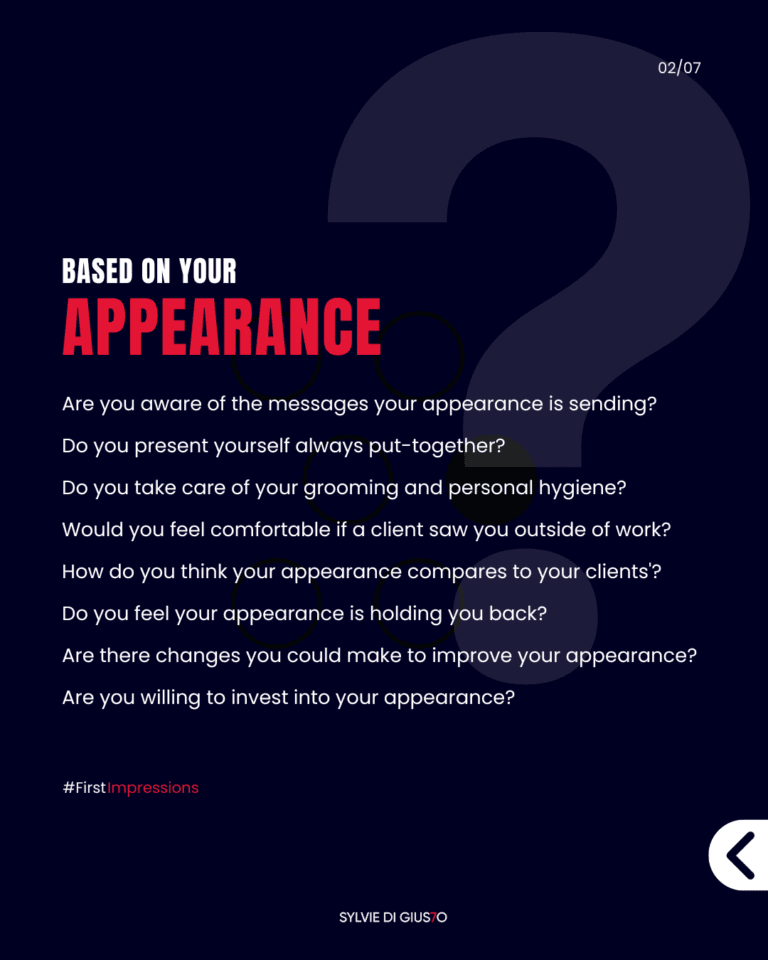
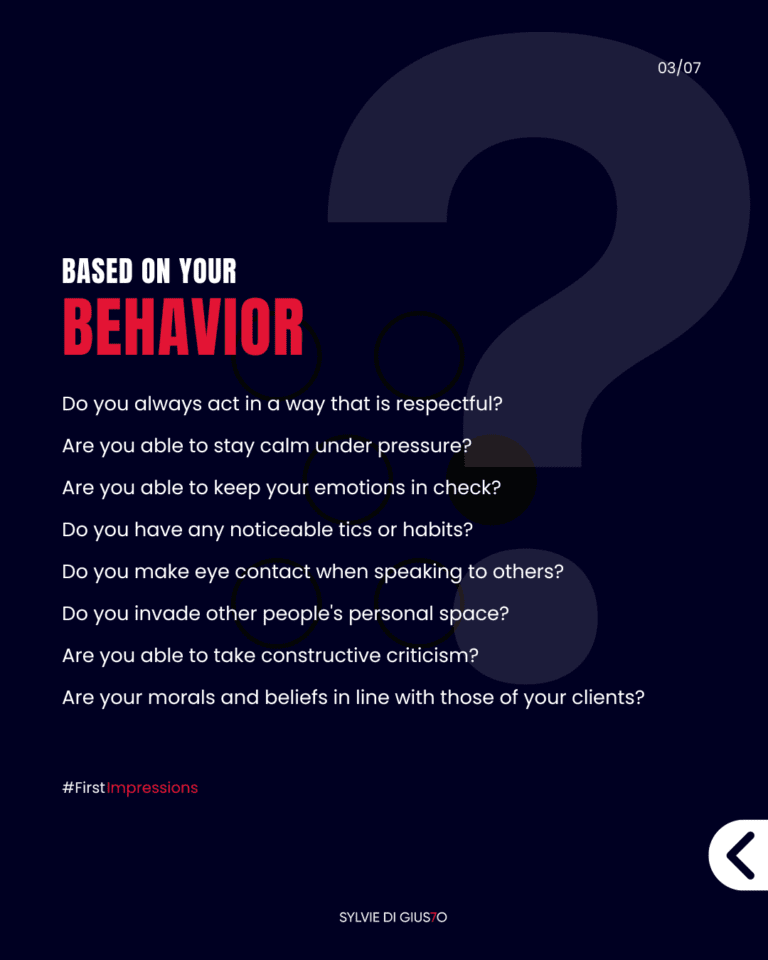
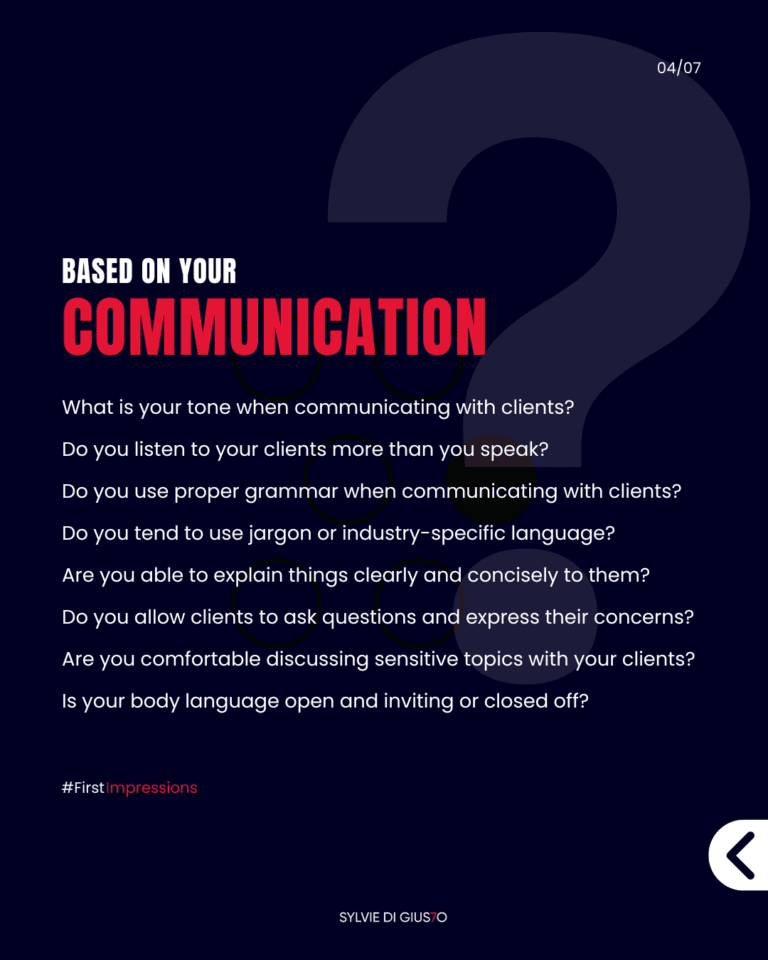
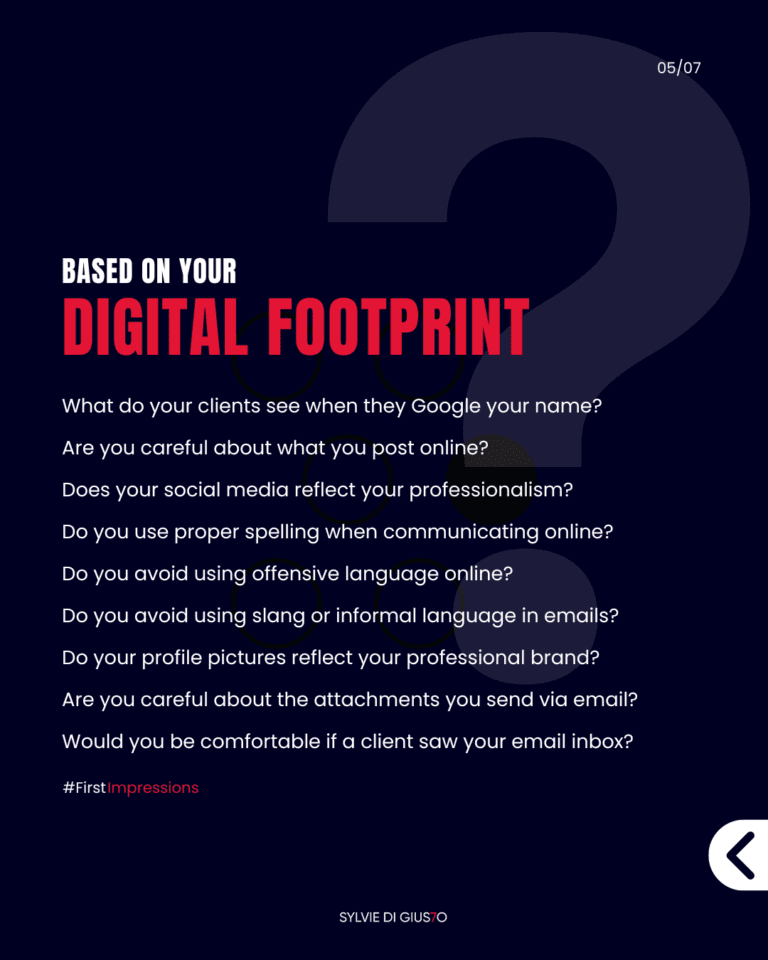
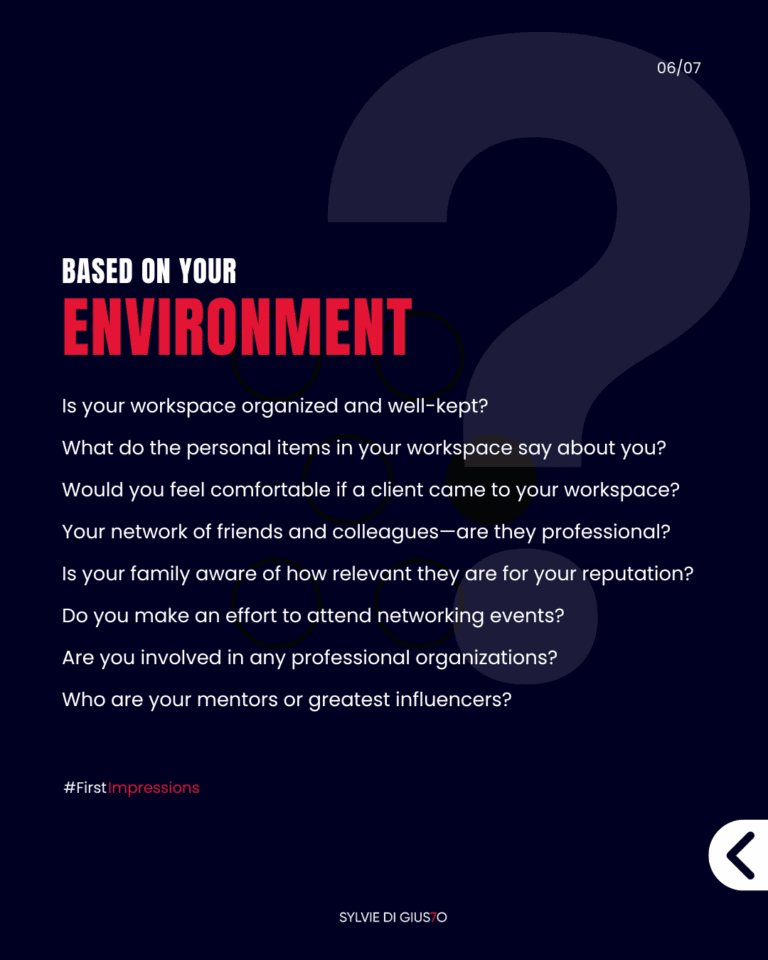

PS: Interested in more content like this? Make sure to follow me on Instagram. It’s where I visualize and publish my thoughts daily. I hope to see you there.




